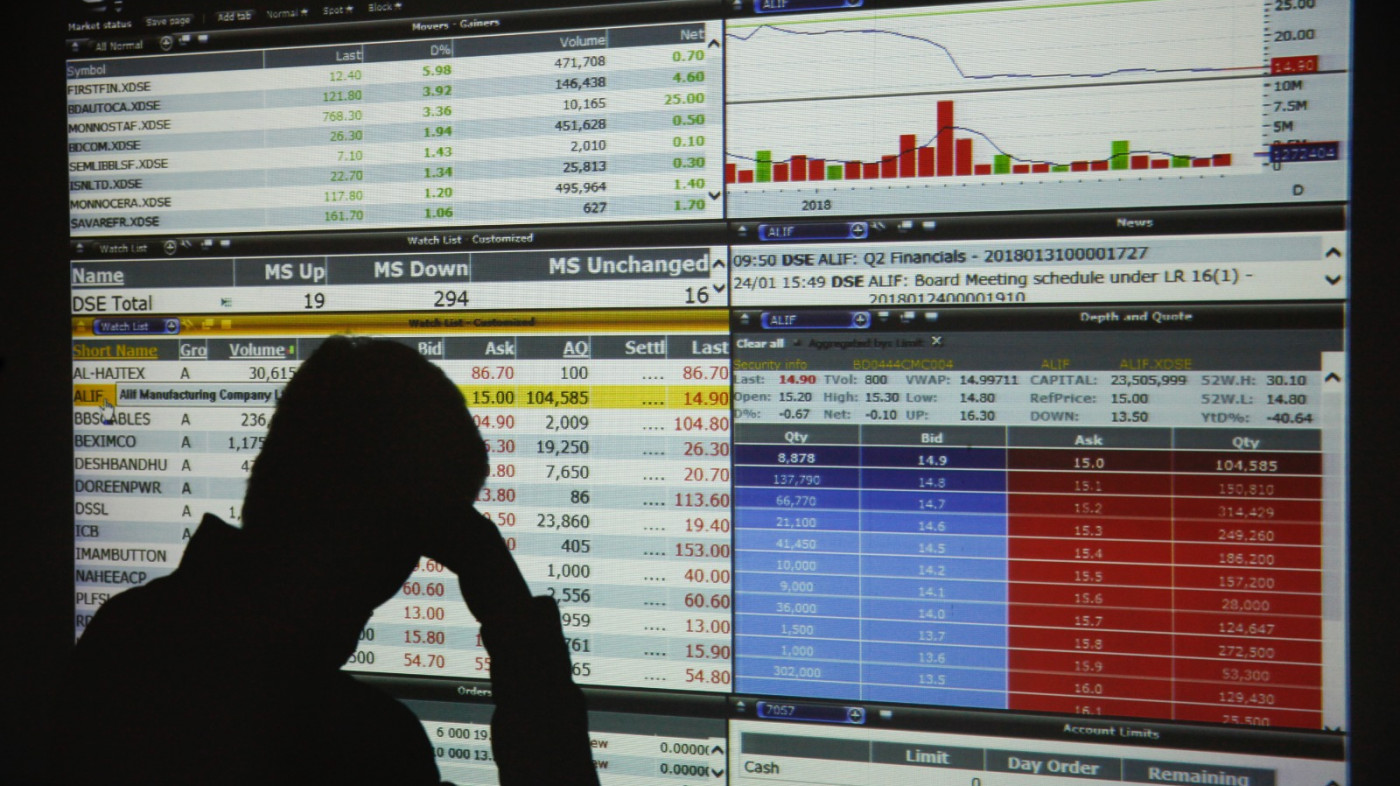In a deep downward spiral since the short-lived market peak of early February, DSEX, the broad-based index of the Dhaka Stock Exchange (DSE), fell by around 15% to 5,431 today, the lowest since 28 April 2021.
Meanwhile, more than Tk93,000 crore of capital has eroded since the withdrawal of the floor price four months ago, with over 78,000 investors' accounts emptied while only 13,395 accounts were added.
Stockbrokers and market experts said too many negative triggers – rising interest rates, fears of taxes on individual investors' capital gains from listed securities, subdued corporate earnings, and a serious confidence crisis – are collectively hurting stock bulls.
Akramul Alam, head of research at brokerage firm Royal Capital, said the average price-to-earnings ratio at the DSE has already fallen below 11, which is double or higher in the bourses of India and Pakistan. This indicates that the stock market here is undervalued, he added.
Tobacco giant British American Tobacco Bangladesh shares were trading at an 11.16 price-to-earnings ratio today, while the top drug maker Square Pharmaceuticals had a ratio of 8.5.
The common stock market strategy of buying quality companies at depressed price levels is not working nowadays, said Chartered Financial Analyst Md Mominul Haque, chief investment officer of asset management firm Ekush Wealth Management.
"Smart investors find it easier to earn an 11%-12% guaranteed annual return from fixed income treasury bills and bonds, rather than risking their capital in a volatile situation across all fronts – macroeconomic, business performance, and the market itself," he added.
Both the investment experts said the stock market downturn in a rising rates environment is nothing unexpected, and investors mainly look for a sign of reversal in the negatively correlated money and stock market.
"The National Board of Revenue (NBR)'s move to impose a 15% tax on individual investors' capital gains over Tk40 lakh from the stock market created a fresh round of selloff in the market recently," said Md Saiful Islam, president of the DSE Brokers Association (DBA).
The market stopped falling earlier this month when the Bangladesh Securities and Exchange Commission (BSEC) Chairman, Professor Shibli Rubayat Ul Islam, told journalists that NBR officials had assured him there would be no imposition of such tax right now.
However, the market dived deeper following news updates last week that the NBR had initially sought and obtained Prime Minister Sheikh Hasina's approval to proceed with the capital gain tax, alongside many other tax elements of the upcoming national budget.
"The time is tough right now for stock investors," said DBA President Saiful Islam, adding that the recent regulatory intervention by limiting the daily downward price limit to 3%, down from 10%, has also disrupted the market rhythm.
Echoing others, stock market expert Abu Ahmed, former professor of economics at the University of Dhaka, said the government should think wisely about imposing the capital gain tax during a stock market downturn.
Md Sayadur Rahman, president of the CEO Forum representing top-tier brokerage executives, said that if investors and the market weaken, the government might end up with much less revenue from the capital market, as it would reduce the tax collected by the NBR from daily trading turnover in the bourses.
DSE turnover dropped to Tk409 crore today, which surged to over Tk1,100 crore on 7 May when investors believed that the tax would not be imposed.
Professor Abu Ahmed blamed the lack of good governance, listing of weaker firms for the last one and a half decades, insider trading, market manipulation, and frequent unconventional regulatory interventions in trading for hurting the market's most significant element – trust.
For instance, the floor price for one and half year did not help any investor as the regulator had to withdraw it at some point and the market fell free.
The ongoing 3% lower limit imposed recently again proved to have been worthless as the market fell even lower, said Professor Abu Ahmed.
"The regulator should let the market trade free and refrain from further interference," he said, adding that serious investors are fearful about frequent changes in rules.
Source: The Business Standard
